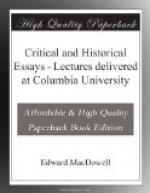After all has been said, it is perhaps best to admit that, so far as Greek music is concerned, its better part certainly lay in poetry. In ancient times all poetry was sung or chanted; it was what I have called impassioned speech. The declamation of “The Iliad” and “The Odyssey” constituted what was really the “vocal” music of the poems. With the Greeks the word “music” (mousike) included all the aesthetic culture that formed part of the education of youth; in the same general way a poet was called a singer, and even in Roman times we find Terence, in his “Phormio,” alluding to poets as musicians. That Aeschylus and Sophocles were not musicians, as we understand the term, is very evident in spite of the controversies on the subject.
Impassioned speech, then, was all that existed of vocal music, and as such was in every way merely the audible expression of poetry. I have no doubt that this is the explanation of the statement that Aeschylus and Sophocles wrote what has been termed the music to their tragedies. What they really did was to teach the chorus the proper declamation and stage action. It is well known that at the Dionysian Festival it was to the poet as “chorus master” that the prize was awarded, so entirely were the arts identified one with the other. That declamation may often reach the power of music, it is hardly necessary to say. Among modern poets, let any one, for instance, look at Tennyson’s “Passing of Arthur” for an example of this kind of music; the mere sound of the words completes the picture. For instance, when Arthur is dying and gives his sword, Excalibur, to Sir Bedivere with the command to throw it into the mere, the latter twice fails to do so, and returns to Arthur telling him that all he saw was
“The water lapping on the
crag
And the long ripple washing
in the reeds.”
But when at last he throws it, the magic sword
“Made lightnings in the splendour
of the moon
And flashing round and round,
and whirl’d in an arch
Shot like a streamer of the
northern morn.
So flashed and fell the brand
Excalibur.”
Again, when Sir Bedivere, carrying the dying king, stumbles up over the icy rocks to the shore, his armour clashing and clanking, the verse uses all the clangour of cr—ck, the slipping s’s too, and the vowel a is used in all its changes; when the shore is finally reached, the verse suddenly turns into smoothness, the long o’s giving the same feeling of breadth and calm that modern music would attempt if it treated the same subject.
Here are the lines:
Dry clash’d his harness
in the icy caves
And barren chasms, and all
to left and right
The bare, black cliff clang’d
round him as he based
His feet on juts of slippery
crag that rang
Sharp-smitten with the dint
of armed heels.
And on a sudden, lo! the level
lake
And the long glories of the
winter moon.




